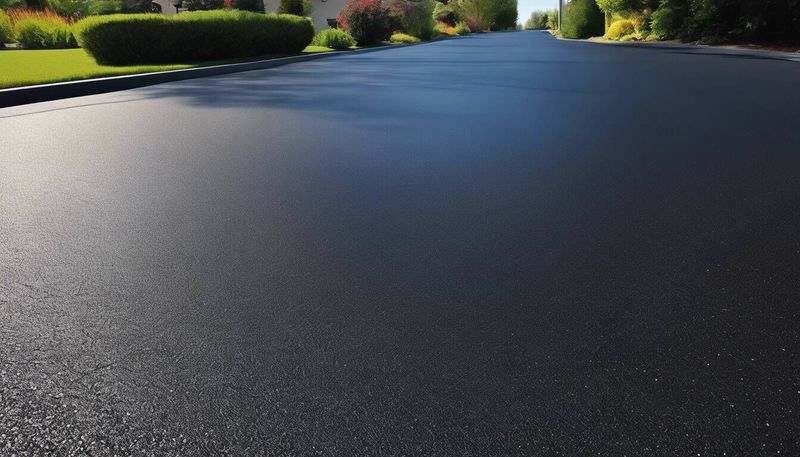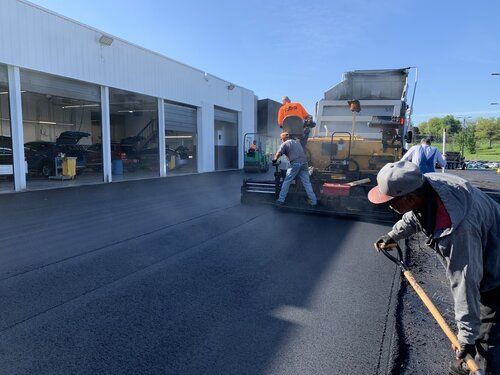As homeowners, we constantly look for ways to enhance our property, not just in aesthetics but also in functionality and value. One of the most significant decisions you’ll make about your home is regarding your driveway. When choosing the best material for driveway construction, many homeowners face a dilemma between asphalt and other materials like concrete. This article aims to highlight The Benefits of Installing an Asphalt Driveway: A Wise Investment, detailing why asphalt driveways often emerge as the superior choice.
What is an Asphalt Driveway?
An asphalt driveway is a durable surface made from a mixture of aggregates (like sand and gravel) and asphalt binder. It’s a popular choice for many residential and commercial properties due to its strength, smooth finish, and cost-effectiveness.
Key Components of Asphalt Driveways
- Aggregates: These are small stones that provide strength. Asphalt Binder: The glue that holds the aggregates together. Surface Layer: The top layer that provides a smooth finish.
Why Choose Asphalt?
When considering driveway options, asphalt stands out for various reasons.
Durability and Longevity
Asphalt driveways are known for their durability, lasting anywhere from 15 to 30 years with proper installation and maintenance. They can withstand heavy loads and resist cracking better than some alternatives.
Cost-Effectiveness
One of the primary factors influencing driveway installation is cost. The asphalt driveway cost is generally lower than that of concrete or pavers. According to recent statistics, the average asphalt paving cost ranges between $3 to $6 per square foot, making it an attractive option for budget-conscious homeowners.
The Installation Process
1. Site Preparation
Before installation begins, the area must be cleared of vegetation, debris, and any existing pavement. Proper grading ensures effective drainage.
2. Base Layer Application
A strong base layer using crushed stone provides stability for your new driveway.
3. Asphalt Paving
Once the base is ready, hot mix asphalt paving takes place using specialized equipment operated by professional asphalt paving contractors.
4. Compaction
After laying down the asphalt, compaction ensures a smooth surface free from air pockets or imperfections.
The Importance of Professional Installation
While some may consider DIY options for installing an asphalt driveway, hiring experienced professionals ensures quality work and longevity. Local asphalt companies offer expertise in adhering to local regulations while delivering high-quality results.
Maintenance Needs: Keeping Your Driveway in Top Shape
Proper maintenance can significantly extend the lifespan of your asphalt driveway. Here are key aspects to consider:
Regular Inspections
Inspecting your driveway regularly helps identify cracks or potholes early on before they worsen.
Sealcoating Services
Engaging in routine sealcoating can protect your driveway from UV rays and oil spills while enhancing its color and appearance.
What is Sealcoating?
Sealcoating involves applying a protective layer over asphalt surfaces to prevent damage from elements such as moisture and chemicals.
Benefits of Sealcoating
- Enhances curb appeal Extends lifespan Reduces repair costs
Types of Repairs: Addressing Common Issues
Even with regular maintenance, wear-and-tear can https://www.platinumpavingkc.com/ paving companies near me occur over time:
Crack Sealing
Cracks should be sealed promptly to prevent water infiltration that could lead to larger issues.
Patching
For deeper damage like potholes, patching may be necessary; this process fills in damaged areas with fresh asphalt material.
Comparative Analysis: Asphalt vs Concrete Driveways
When weighing up options between an asphalt driveway vs concrete:

| Feature | Asphalt | Concrete | |-----------------------------|-------------------------------------|-------------------------------| | Cost | Lower initial cost | Higher initial investment | | Lifespan | 15-30 years | 25-40 years | | Maintenance Frequency | Requires sealcoating every 2-3 years | Requires less frequent sealing | | Repairability | Easier repairs | More challenging repairs |

Environmental Considerations: Is Asphalt Eco-Friendly?
Many wonder about the environmental impact of different materials. Fortunately:
Recyclability
Asphalt is one of the most recycled materials globally; old pavements can be reused in new installations through processes like milling and overlay services.
Reduced Heat Island Effect
Asphalt driveways can help mitigate urban heat islands when designed properly with porous materials or lighter colors.
Accessibility Features: ADA-Compliant Solutions
Incorporating accessibility features like ADA-compliant parking lot striping ensures your space meets legal requirements while enhancing usability for all visitors.
Parking Lot Paving: A Business Perspective
For commercial properties considering a new parking lot:
Cost Factors
Understanding parking lot paving costs involves various elements such as size, location, and design specifications.
Long-Term Value
Investing in quality parking lot paving results in improved customer experiences and safety features through effective design layouts including fire lane striping or custom numbering systems.
Asphalt Resurfacing vs Paving
When faced with deteriorating pavements:
Resurfacing
This method involves applying a new layer over existing asphalt without complete removal—ideal for minor damages.
Repaving
Complete replacement may be necessary if structural failures exist; this method offers long-term solutions but at higher costs initially compared to resurfacing options.
Frequently Asked Questions
1. How long does an asphalt driveway last? An asphalt driveway typically lasts between 15 to 30 years with proper care and maintenance practices such as sealcoating every few years.
2. What’s involved in sealcoating? Sealcoating is applying a protective layer on top of existing asphalt surfaces to guard against wear from weather elements or oils while enhancing appearance too!
3. How much does it cost to install an asphalt driveway? The average cost varies based on size but generally falls within $3-$6 per square foot depending on specific site conditions & geographical locations!
4. Can I repair my own cracked driveway? While minor cracks may be manageable DIY projects using crack sealants available at hardware stores; larger damages should ideally involve professional inspection first!
5. Is sealcoating necessary every year? Not necessarily! Depending upon traffic & weather conditions; every two-three years might suffice unless high-volume usage necessitates more frequent attention!
6. Are there environmentally friendly options available with modern methods? Absolutely! Recycled materials are often utilized during installation processes ensuring sustainability alongside durability benefits!
Conclusion
Choosing an appropriate surface for your property requires careful consideration of both immediate needs & long-term implications regarding maintenance costs versus potential returns on investment down-the-line! Through understanding key benefits associated with installing an asphalt driveway, homeowners can ensure they make informed choices that not only enhance curb appeal but also contribute positively towards overall property value—all while keeping practicality front-of-mind! By investing wisely today into quality infrastructure like reputable contractor services offered by local asphalt companies, individuals will ultimately reap rewards far beyond mere aesthetics alone!